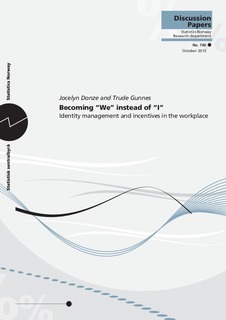Becoming “We” instead of “I”. Identity management and incentives in the workplace
| dc.contributor.author | Donze, Jocelyn | |
| dc.contributor.author | Gunnes, Trude | |
| dc.coverage.spatial | Norway | nb_NO |
| dc.date.accessioned | 2019-11-12T10:14:57Z | |
| dc.date.available | 2019-11-12T10:14:57Z | |
| dc.date.issued | 2013-10 | |
| dc.identifier.issn | 1892-753X | |
| dc.identifier.uri | http://hdl.handle.net/11250/2627897 | |
| dc.description.abstract | This article studies how a firm fosters formal and informal interaction among its employees to create a collective identity and positively influence their effort. We develop an agency model, in which employees have both a personal and a social ideal for effort. The firm does not observe the personal ideals, which gives rise to an adverse selection problem, but can make its workforce more sensitive to the social ideal by allocating part of working hours to social interaction. We show that there are two reasons why the firm invests in social capital. First, it reinforces the effectiveness of monetary incentives. Second, by creating a shared identity in the workforce, the firm is able to reduce the adverse selection problem. We also show that the firm allocates more time to bonding activities when employees have low personal ideals for effort or when they are more heterogeneous as regards these ideals. | nb_NO |
| dc.language.iso | eng | nb_NO |
| dc.publisher | Statistisk sentralbyrå | nb_NO |
| dc.relation.ispartofseries | Discussion papers;760 | |
| dc.subject | JEL classification: D2 | nb_NO |
| dc.subject | JEL classification: D8 | nb_NO |
| dc.subject | JEL classification: J3 | nb_NO |
| dc.subject | JEL classification: M5 | nb_NO |
| dc.title | Becoming “We” instead of “I”. Identity management and incentives in the workplace | nb_NO |
| dc.type | Working paper | nb_NO |
| dc.description.version | publishedVersion | nb_NO |
| dc.subject.nsi | VDP::Matematikk og Naturvitenskap: 400::Matematikk: 410::Statistikk: 412 | nb_NO |
Tilhørende fil(er)
Denne innførselen finnes i følgende samling(er)
-
Discussion Papers [1003]
